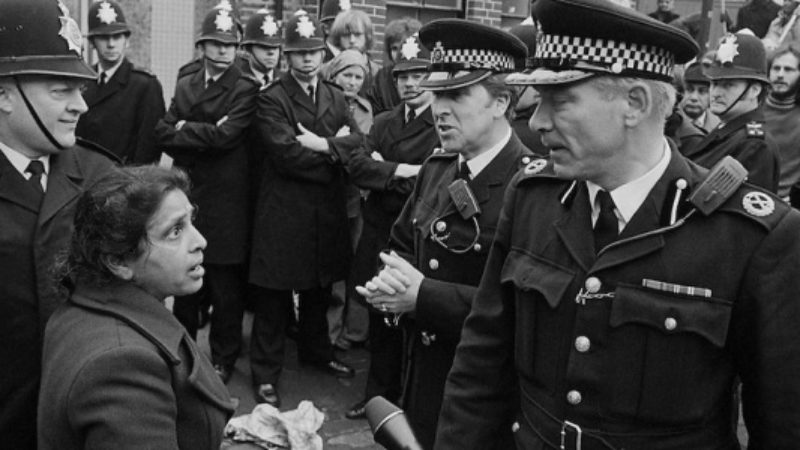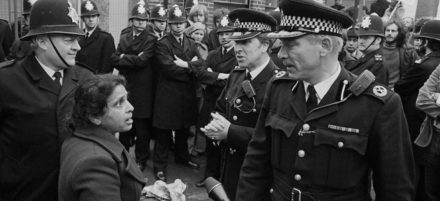

Jayaben Desai was today included among just seven people on the Power List published by BBC Radio 4’s Woman’s Hour.
The summer of 1976 was one of the hottest on record. In the sweltering conditions of the Grunwick film processing plants, in Willesden, Gujarati workers from East Africa sweated under the yoke of company boss George Ward. Most of them had been expelled from East Africa where they were the mercantile, administrative and business class. They seethed with anger and humiliation. They were reluctant refugees, now treated with contempt.
“My Asians”, as Ward called them, received poverty pay for long hours. Forced to work compulsory overtime, the women had to put their hand up to go to the toilet. Crude systems were put in place by a manager, Malcolm Alden, to identify the slowest workers who would then be instantly dismissed. But those managers reckoned without Jayaben Desai.
Just four foot and 10 inches tall, she led the first walk out on 23 August 1976. Born in Gujarat, she married a tyre-factory manager, Suryakant in Tanzania. A proud Hindu woman, she had been schooled in the Indian independence movement and was inspired by Gandhi as she came in turn to inspire millions. “What you are running here is not a factory” she told Alden, “it is a zoo. But in a zoo there are many types of animals. Some are monkeys who dance on your fingertips. Others are lions who can bite your head off. We are those lions, Mr Manager.”
Thus began a strike that would make history, a walk out by initially fewer than 100 workers. As they went out the gate, she told the strikers “this man (Alden) would not speak to white workers like he speaks to us”. Such sadly was often the cold welcome to Britain of those who came to our shores.
The strikers’ cause looked hopeless. But that reckoned without three things. First, the strong Brent Trades Council with deep roots in the local factories and, very unusually for the time, strong bonds with Brent’s immigrant communities.
Second, the Union Apex, now the GMB. None of those who came out on strike were in a union yet, but again, very unusually for the time, Apex took them in, otherwise the strike might have been over in days.
Third, of course, Jayaben Desai and the Grunwick strikers. Those brave women and the men who stood with them. Jayaben talked the language of Gandhi, with the burning sense of injustice of La Passionara, indeed at times she was almost Shakespearean.
But still the odds were against them, all the more so because of the sorry history of the 10 years previous to the outbreak of the strike. Unions had not always been on the side of black and Asian workers. On the contrary, in 1968 dockers and meat porters marched in support of Enoch Powell following his infamous racist Rivers of Blood speech. Workforces sometimes polarised along racial lines and white executives let down black or Asian workers. Yet, defying all the odds, Grunwick was to see the biggest mobilisation in labour movement history around a local dispute of predominantly newly arrived Gujarati workers.
The strike was nearly won when the then Union of Post Office Workers blacked the mail to Grunwick in solidarity, bringing their mail-order film processing business to a halt. Yet the blacking was lifted when legal action was taken by the shadowy National Association of Freedom, closely associated with the new leader of the Conservative Party, Margaret Thatcher. The strikers were in despair but they were lifted to carry on the struggle by a magnificent speech to a packed Brent Trades and Labour Hall meeting by Jayaben. “Who are we to give up? Never. We fight on” she said.
With Apex, the women and the Trades Council then organised visits to well over 1,000 workplaces in the months that followed. Engineering and car plants, dockyards and steel mills, aircraft factories, the Grunwick strikers toured the length and breadth of the land. The dispute became a cause celebre in the trade union movement. Then, following the arrest of 84 pickets on 23 June 1977, the Crickelwood post office workers at the local sorting office bravely took unofficial action to black the mail to Grunwick a second time. All 100 were white bar one West Indian. They were suspended and threatened with the sack. Yet for 44 days they stood firm as thousands of workers swelled the picket line.
It was then on 30 June that Labour announced a Court of Inquiry under Lord Justice Scarman, yet Ward bluntly refused to accept the findings that Apex should be recognised and the strikers should be reinstated. The findings were morally binding but not legally binding. Ward made his own infamous version of history by becoming the first employer to reject the findings of a Court of Inquiry.
What followed were months of attempts to regain the initiative but ultimately to no avail. The strikers fought on through a second bitter winter. But it became increasingly clear that the strike could not be won. When the strike committee ended the strike, it was an emotional meeting but characterised by a strong view that no workers could ever have fought harder or longer. There was a sense of pride, yes, pride because theirs had been a noble cause and theirs was a sense of having made history.
The strike saw the biggest mobilisation in labour movement history around a local dispute with 20,000 descending on Chapter Road, Willesden, on July 11 1977. Ultimately we did not win but you never lose a struggle like Grunwick. The legal right to union recognition was ultimately won under a Labour government in a historic lasting legacy of the dispute.
Grunwick also saw, however, the emergence of the “militant right”. Grunwick was a harbinger of what was to come, the era of Mrs Thatcher when trade unions came to be regarded as “the enemy within”.
The history of Grunwick is remarkable but Grunwick is not just history. Because once again the tensions of the 1970s are scarring our country. To their eternal shame, mainstream politicians put the politics of race and immigration centre-stage in the referendum on the European Union. There is a growing xenophobia in a fearful and fractured country. Legitimate concerns arising out of the exploitation of immigrant workers and undercutting of those here for generations are being exploited.
One of the few pillars left of social solidarity is the trade union movement. Upon it falls a heavy duty to unite around fair and equal treatment of all workers. That is why the determination of the GMB and its new general secretary, Tim Roache, to celebrate history and learn from it is so important. For they have captured what Jayaben said to me when we last met before she died. “Mr Jack” she said “people will always want their freedom. As we have fought, others will fight. If we have inspired, I will die a happy woman”.
It was in that spirit that the words came back to me, when we scattered her ashes on the Thames, of the exchange between Lord Justice Scarman and that awful manager, Malcolm Alden, before the Court of Inquiry.
Alden: “All of a sudden she (Jayaben Desai) kind of exploded and said ‘I want my freedom. I am going. I have had enough’.”
Lord Justice Scarman: “Could you understand what she was shouting about?”
Malcom Alden: “‘I want my freedom’ is the phrase that stands out in my mind.”
Jack Dromey was secretary of the Brent Trades Council and a member of the Grunwick strike committee throughout the dispute. He wrote Grunwick: The Workers’ Story with fellow Trades Council member, Graham Taylor.




More from LabourList
‘Tackling poverty should be the legacy of Keir Starmer’s government’
‘The High Court judgment brings more uncertainty for the trans community’
‘There are good and bad businesses. Labour needs to be able to explain the difference’